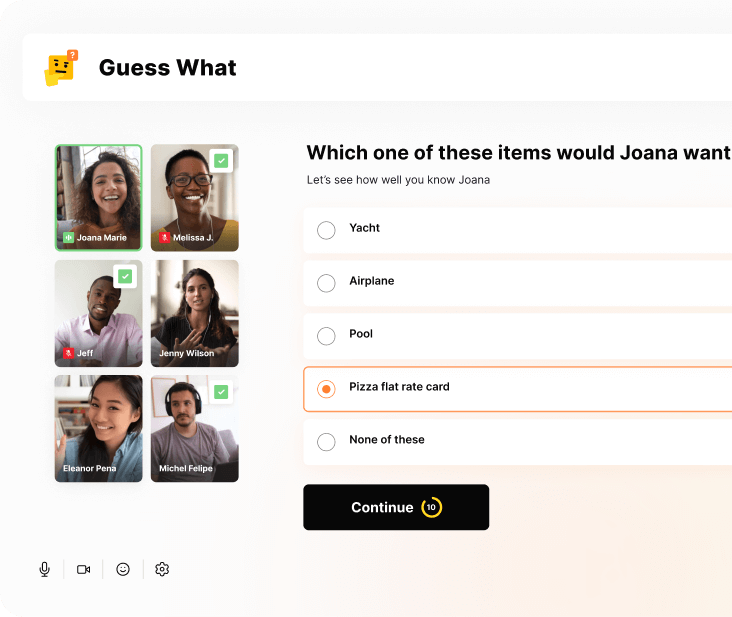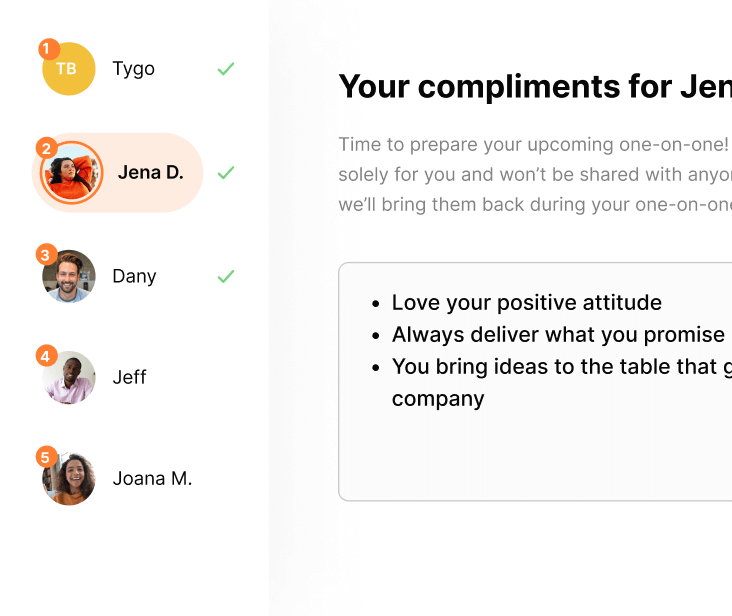Back to Blog
How are employee engagement and satisfaction related?
Employee engagement and job satisfaction are two sides of the same coin. They both contribute to the overall happiness of an individual in the workplace.
Employees with higher levels of engagement are more likely to be satisfied with their jobs, leading to increased productivity and profitability for employers.
When it comes down to it, though, how exactly does employee engagement affect job satisfaction? Here’s what the research says.
Share fun facts and bond with a team quiz
Have your participants choose from a list of questions they’d like their coworkers to answer about them, before watching as they guess the right answer.
01. Yes
share-fun-facts-and-bond-with-a-team-quiz

Run a guided recognition activity
Have your participants choose from a list of questions they’d like their coworkers to answer about them, before watching as they guess the right answer.
01. Yes
run-a-guided-recognition-activity

Organize a virtual cooking class
Hire a professional chef to help your team cook a delicious lunch or dinner. May be difficult for co-workers with families. To find providers and get tips, read our blog about virtual cooking classes.
02. No
organize-a-virtual-cooking-class

Hire a stand-up comedian
Have your participants choose from a list of questions they’d like their coworkers to answer about them, before watching as they guess the right answer.
02. No
hire-a-stand-up-comedian

No items found
No items found
Table of contents
Employee engagement and job satisfaction are two sides of the same coin. They both contribute to the overall happiness of an individual in the workplace.
Employees with higher levels of engagement are more likely to be satisfied with their jobs, leading to increased productivity and profitability for employers.
When it comes down to it, though, how exactly does employee engagement affect job satisfaction? Here’s what the research says.
What’s the difference between employee engagement and employee satisfaction?
Researchers have created employee surveys to measure job satisfaction. They’ve also pulled together a variety of factors that contribute to employee engagement. The first step to understanding why it needs both is to look at the definitions:
- The American Psychological Association defines job satisfaction as “The attitude of a worker toward his or her job, often expressed as a hedonic response of liking or disliking the work itself, the rewards, or the context”. In other words, job satisfaction describes how content an employee is with their work.
- Employee engagement refers to how involved and committed employees feel toward their work.
So, what is the difference between job satisfaction and employee engagement? It all comes down to the focus. Satisfaction has to do with an employee’s response, the idea of liking or disliking their work and workplace. Engagement has a much bigger scope and encompasses the company’s environment, culture, and individual factors.
Deloitte’s in-depth research of employee engagement says that employees will be engaged if a company offers a five-part combination. They want “meaningful work, hands-on management, positive work environment, growth opportunity, and trust in leadership.”
Engagement leads to various positive outcomes like low turnover, high productivity, and expertise growth. These outcomes ideally include job satisfaction as well. However, an employee can also be satisfied without being engaged.
Let's consider an employee who frequently has downtime, allowing them to take a lot of breaks. Their manager also doesn't delegate tasks to them very often. This employee likes having an easy, stress-free job and enjoys their work. The person would be satisfied but not engaged.
This example shows that job satisfaction isn't a comprehensive measure. Engagement, on the other hand, influences contentment and productivity.
How do they influence each other?
The question of whether an employee is engaged or satisfied or both is not studied often. A 2018 doctoral study found that these two factors rise together and fall together. Job satisfaction and employee engagement went up simultaneously when new policies or actions improved the workplace.
However, the work of Abhishek Mittal may shed light on a key distinction. Job satisfaction, his work says, is one-way, with employees rating what the company can do for them. Employee engagement is two-way, with both the employee’s perspective on the environment and work as well as the company’s perspective on whether the company is succeeding in meeting goals.
Put another way, Laura Sheffield points out that you can’t reach employee engagement without job satisfaction. However, it’s just a first stop since people can be satisfied without advancing the company’s goals.
The key is implementing changes that improve productivity and satisfaction, two core components of engagement. The company suffers if, for instance, you declare a bunch of new days off work just to boost satisfaction alone.
Employees must feel comprehensively supported as they increase productivity. CEOs already see it: employee engagement is seen as key to 71% of CEOs’ overall company strategy. Strong support leads to high output, and the feeling of productivity drives sustainable job satisfaction.
In general, you’ll find the job satisfaction of high performers is tied to high employee engagement. Great employees often want to grow, enjoy a challenge, or take joy in effectiveness. These two factors tend to be important to overall employee engagement.
What can you do to improve both?
Here at Gomada, we’re downright obsessed with finding out how to increase employee engagement. Let us help you boost job satisfaction while reducing turnover and connecting teams. Here are some of the best ways to raise your company’s metrics.
- Check out what the top 10 most satisfied companies are doing right.
- Maintain job satisfaction through transition periods with activities for a moment of change in your company.
- Use team building experiences like Gomada’s Ups and Downs to understand your team’s motivation in context.
- Experiment with employee engagement software and mobile applications. They prompt team members to offer recognition, share their opinion, and more.
- Take surveys periodically to evaluate trends at your company in motivation and engagement and review the wider data.
- Consider a ready-made platform that starts building your team up quickly.
Subscribe to get our latest updates
Subscribe to get our latest updates
.webp)



.jpg)

